Report on Cross-Cultural Management: Motivation and Employee Attitudes
VerifiedAdded on 2022/09/10
|11
|2594
|31
Report
AI Summary
This report examines the article "Expatriate Managers’ Cross-Cultural Motivation and Host Country National Employees’ Attitudes," focusing on cross-cultural relationships in multinational companies. It explores issues like cultural misunderstandings, employee injustice, and the importance of organizational identification (OI). The report emphasizes the need for cultural leadership, the role of cultural models, and the significance of intercultural competencies in managing diverse teams. It highlights the importance of leaders adapting to different cultures, fostering positive interpersonal experiences, and building trust to enhance employee commitment and performance. The report also discusses the implications of these findings, including gaps in research regarding conflict resolution and equitable compensation, while underscoring the need for respecting diverse cultures within organizations. The conclusion stresses the importance of providing cultural freedom to subsidiaries and the positive impact of effective cross-cultural management and intercultural leadership on both employee and manager satisfaction and overall organizational success.
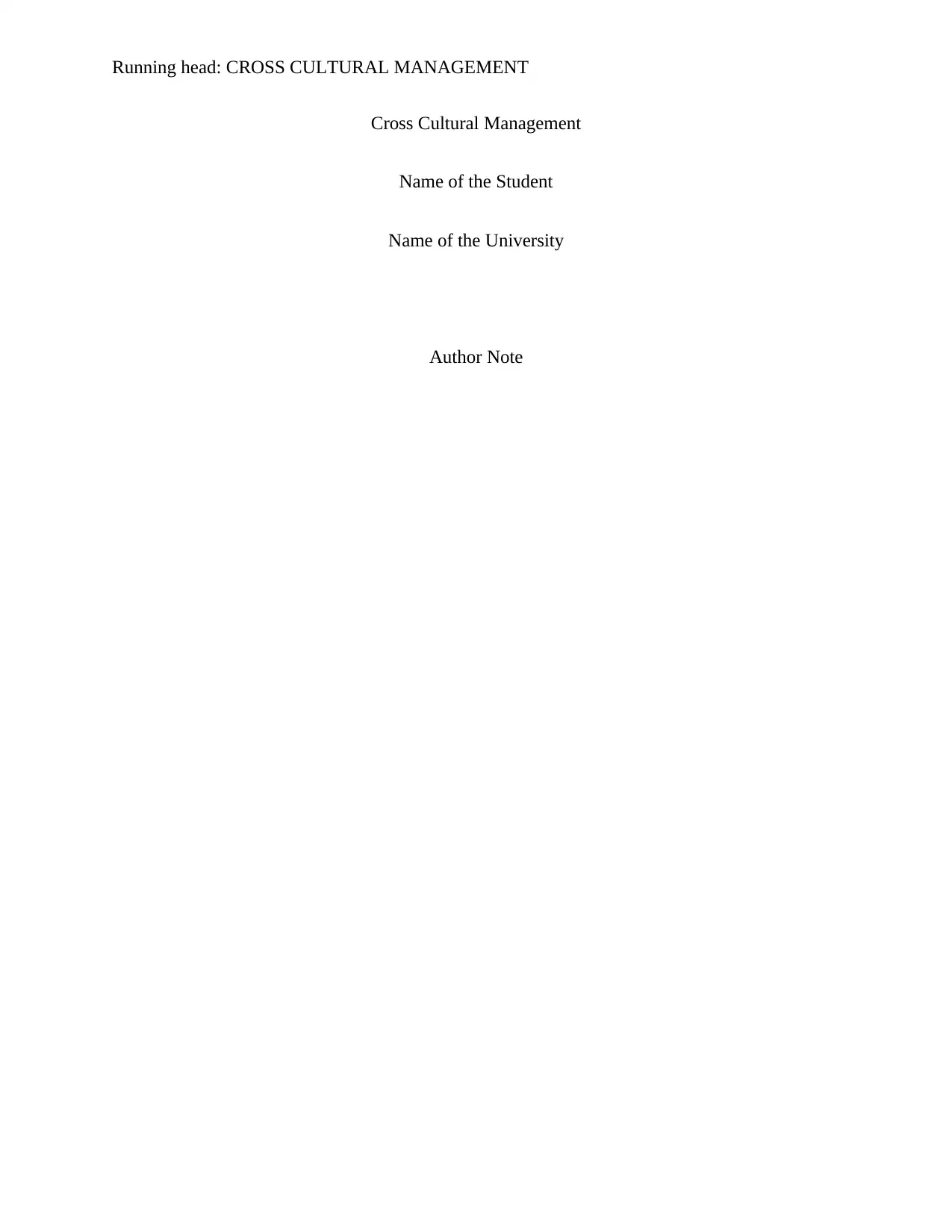
Running head: CROSS CULTURAL MANAGEMENT
Cross Cultural Management
Name of the Student
Name of the University
Author Note
Cross Cultural Management
Name of the Student
Name of the University
Author Note
Paraphrase This Document
Need a fresh take? Get an instant paraphrase of this document with our AI Paraphraser
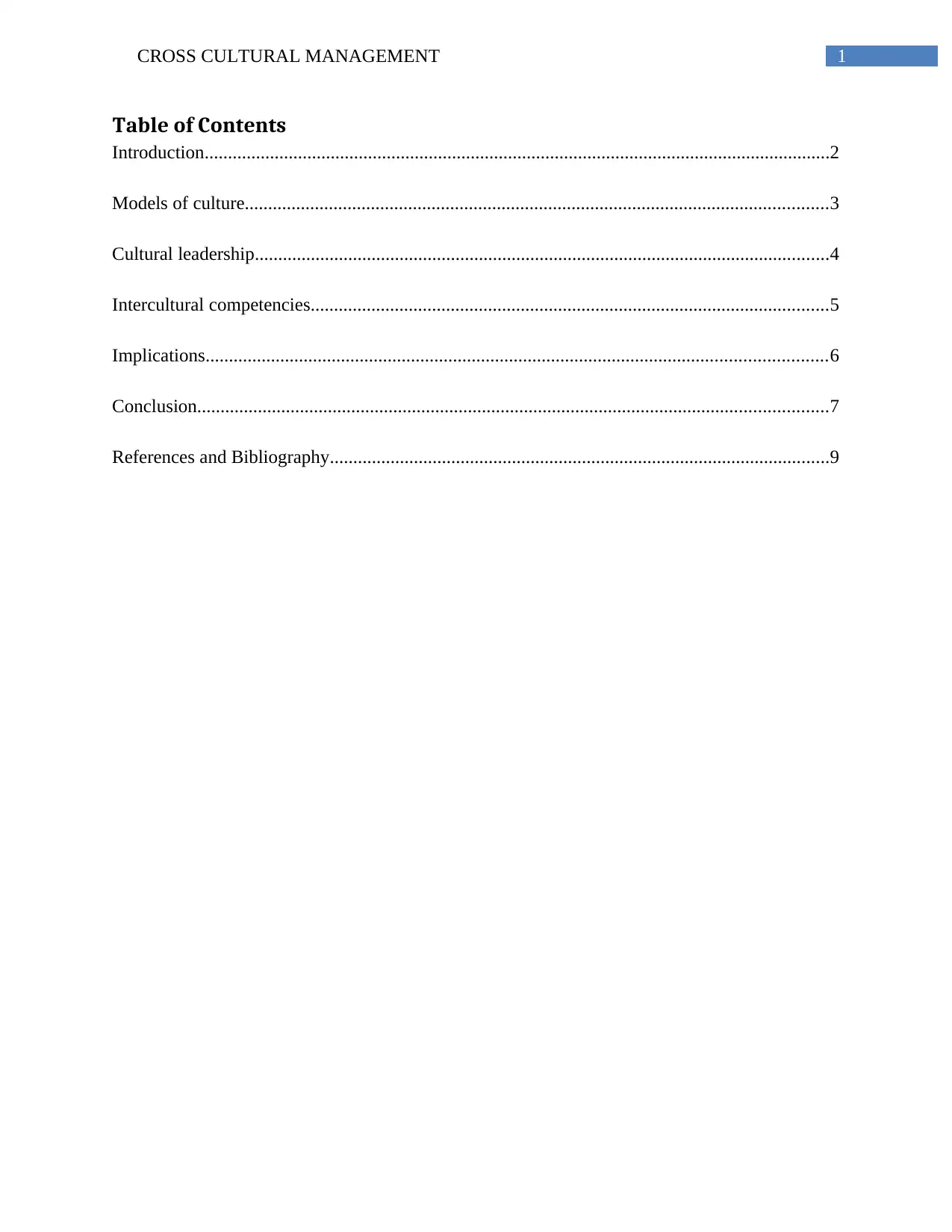
1CROSS CULTURAL MANAGEMENT
Table of Contents
Introduction......................................................................................................................................2
Models of culture.............................................................................................................................3
Cultural leadership...........................................................................................................................4
Intercultural competencies...............................................................................................................5
Implications.....................................................................................................................................6
Conclusion.......................................................................................................................................7
References and Bibliography...........................................................................................................9
Table of Contents
Introduction......................................................................................................................................2
Models of culture.............................................................................................................................3
Cultural leadership...........................................................................................................................4
Intercultural competencies...............................................................................................................5
Implications.....................................................................................................................................6
Conclusion.......................................................................................................................................7
References and Bibliography...........................................................................................................9
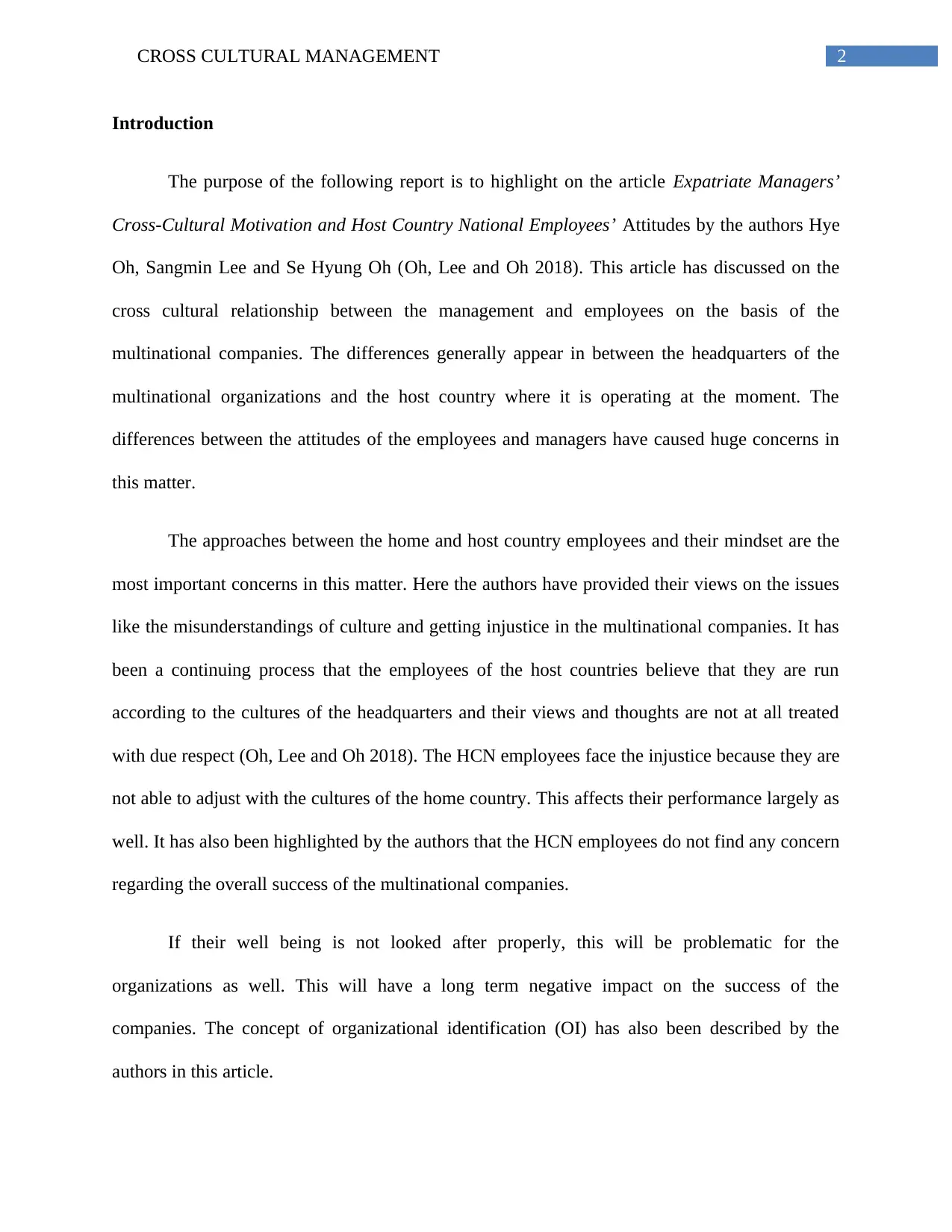
2CROSS CULTURAL MANAGEMENT
Introduction
The purpose of the following report is to highlight on the article Expatriate Managers’
Cross-Cultural Motivation and Host Country National Employees’ Attitudes by the authors Hye
Oh, Sangmin Lee and Se Hyung Oh (Oh, Lee and Oh 2018). This article has discussed on the
cross cultural relationship between the management and employees on the basis of the
multinational companies. The differences generally appear in between the headquarters of the
multinational organizations and the host country where it is operating at the moment. The
differences between the attitudes of the employees and managers have caused huge concerns in
this matter.
The approaches between the home and host country employees and their mindset are the
most important concerns in this matter. Here the authors have provided their views on the issues
like the misunderstandings of culture and getting injustice in the multinational companies. It has
been a continuing process that the employees of the host countries believe that they are run
according to the cultures of the headquarters and their views and thoughts are not at all treated
with due respect (Oh, Lee and Oh 2018). The HCN employees face the injustice because they are
not able to adjust with the cultures of the home country. This affects their performance largely as
well. It has also been highlighted by the authors that the HCN employees do not find any concern
regarding the overall success of the multinational companies.
If their well being is not looked after properly, this will be problematic for the
organizations as well. This will have a long term negative impact on the success of the
companies. The concept of organizational identification (OI) has also been described by the
authors in this article.
Introduction
The purpose of the following report is to highlight on the article Expatriate Managers’
Cross-Cultural Motivation and Host Country National Employees’ Attitudes by the authors Hye
Oh, Sangmin Lee and Se Hyung Oh (Oh, Lee and Oh 2018). This article has discussed on the
cross cultural relationship between the management and employees on the basis of the
multinational companies. The differences generally appear in between the headquarters of the
multinational organizations and the host country where it is operating at the moment. The
differences between the attitudes of the employees and managers have caused huge concerns in
this matter.
The approaches between the home and host country employees and their mindset are the
most important concerns in this matter. Here the authors have provided their views on the issues
like the misunderstandings of culture and getting injustice in the multinational companies. It has
been a continuing process that the employees of the host countries believe that they are run
according to the cultures of the headquarters and their views and thoughts are not at all treated
with due respect (Oh, Lee and Oh 2018). The HCN employees face the injustice because they are
not able to adjust with the cultures of the home country. This affects their performance largely as
well. It has also been highlighted by the authors that the HCN employees do not find any concern
regarding the overall success of the multinational companies.
If their well being is not looked after properly, this will be problematic for the
organizations as well. This will have a long term negative impact on the success of the
companies. The concept of organizational identification (OI) has also been described by the
authors in this article.
⊘ This is a preview!⊘
Do you want full access?
Subscribe today to unlock all pages.

Trusted by 1+ million students worldwide
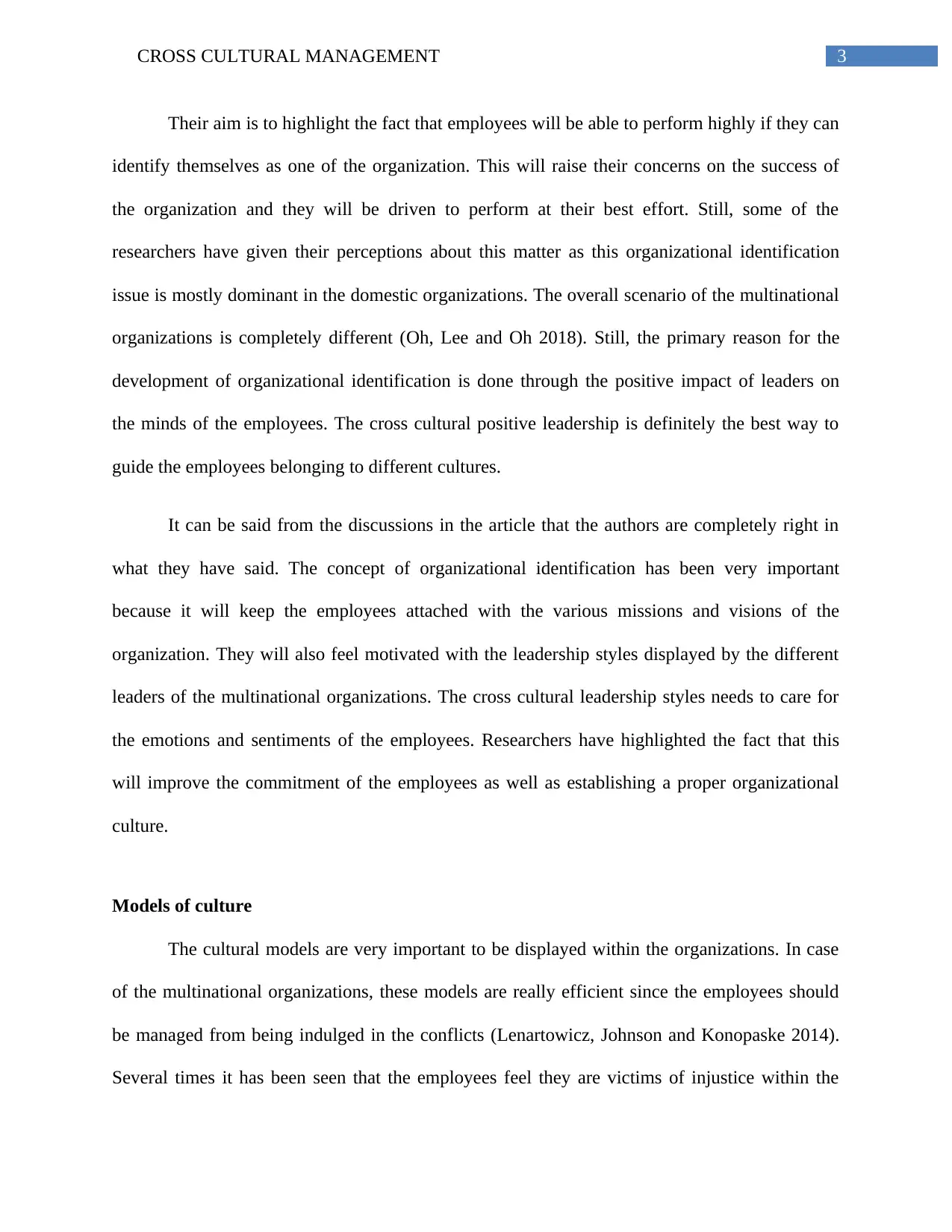
3CROSS CULTURAL MANAGEMENT
Their aim is to highlight the fact that employees will be able to perform highly if they can
identify themselves as one of the organization. This will raise their concerns on the success of
the organization and they will be driven to perform at their best effort. Still, some of the
researchers have given their perceptions about this matter as this organizational identification
issue is mostly dominant in the domestic organizations. The overall scenario of the multinational
organizations is completely different (Oh, Lee and Oh 2018). Still, the primary reason for the
development of organizational identification is done through the positive impact of leaders on
the minds of the employees. The cross cultural positive leadership is definitely the best way to
guide the employees belonging to different cultures.
It can be said from the discussions in the article that the authors are completely right in
what they have said. The concept of organizational identification has been very important
because it will keep the employees attached with the various missions and visions of the
organization. They will also feel motivated with the leadership styles displayed by the different
leaders of the multinational organizations. The cross cultural leadership styles needs to care for
the emotions and sentiments of the employees. Researchers have highlighted the fact that this
will improve the commitment of the employees as well as establishing a proper organizational
culture.
Models of culture
The cultural models are very important to be displayed within the organizations. In case
of the multinational organizations, these models are really efficient since the employees should
be managed from being indulged in the conflicts (Lenartowicz, Johnson and Konopaske 2014).
Several times it has been seen that the employees feel they are victims of injustice within the
Their aim is to highlight the fact that employees will be able to perform highly if they can
identify themselves as one of the organization. This will raise their concerns on the success of
the organization and they will be driven to perform at their best effort. Still, some of the
researchers have given their perceptions about this matter as this organizational identification
issue is mostly dominant in the domestic organizations. The overall scenario of the multinational
organizations is completely different (Oh, Lee and Oh 2018). Still, the primary reason for the
development of organizational identification is done through the positive impact of leaders on
the minds of the employees. The cross cultural positive leadership is definitely the best way to
guide the employees belonging to different cultures.
It can be said from the discussions in the article that the authors are completely right in
what they have said. The concept of organizational identification has been very important
because it will keep the employees attached with the various missions and visions of the
organization. They will also feel motivated with the leadership styles displayed by the different
leaders of the multinational organizations. The cross cultural leadership styles needs to care for
the emotions and sentiments of the employees. Researchers have highlighted the fact that this
will improve the commitment of the employees as well as establishing a proper organizational
culture.
Models of culture
The cultural models are very important to be displayed within the organizations. In case
of the multinational organizations, these models are really efficient since the employees should
be managed from being indulged in the conflicts (Lenartowicz, Johnson and Konopaske 2014).
Several times it has been seen that the employees feel they are victims of injustice within the
Paraphrase This Document
Need a fresh take? Get an instant paraphrase of this document with our AI Paraphraser
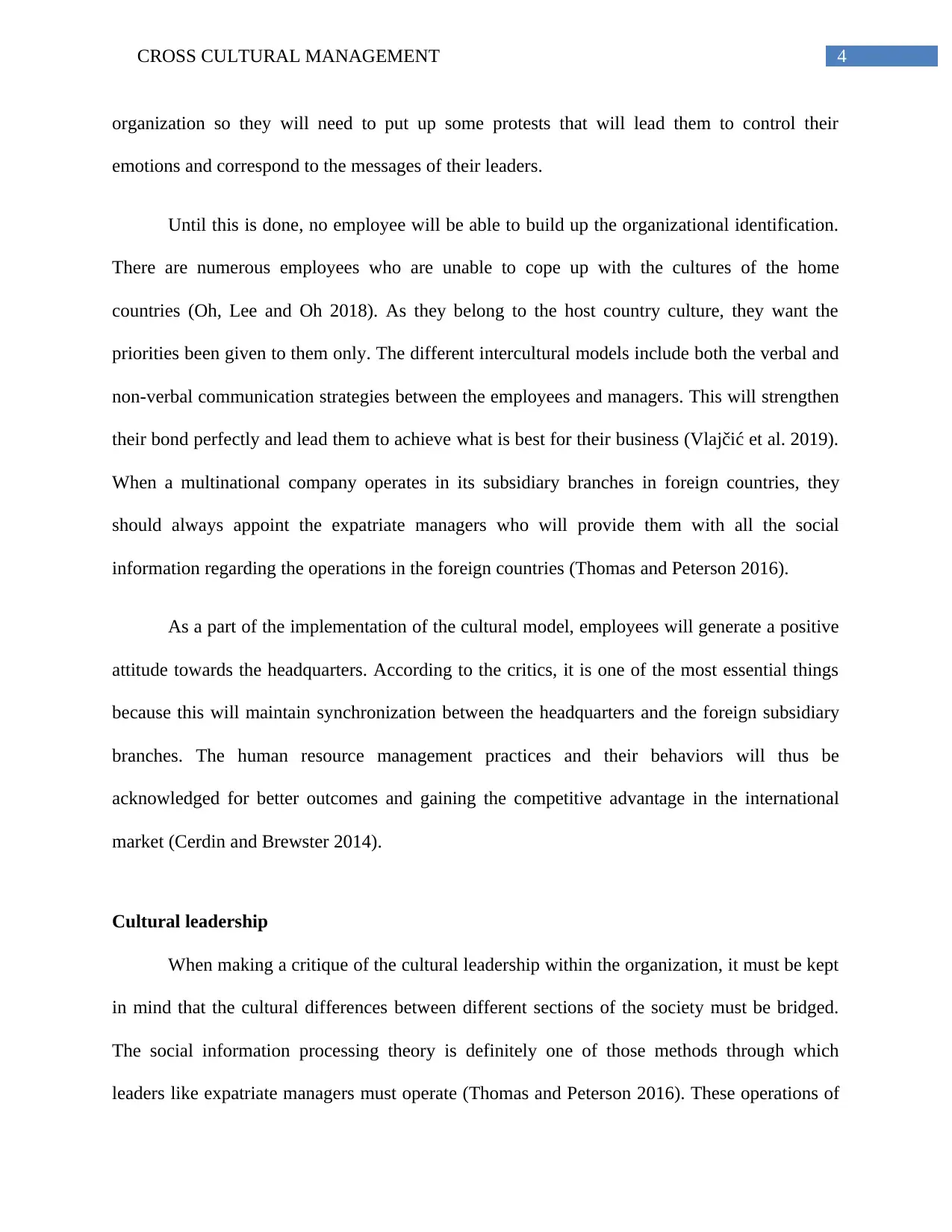
4CROSS CULTURAL MANAGEMENT
organization so they will need to put up some protests that will lead them to control their
emotions and correspond to the messages of their leaders.
Until this is done, no employee will be able to build up the organizational identification.
There are numerous employees who are unable to cope up with the cultures of the home
countries (Oh, Lee and Oh 2018). As they belong to the host country culture, they want the
priorities been given to them only. The different intercultural models include both the verbal and
non-verbal communication strategies between the employees and managers. This will strengthen
their bond perfectly and lead them to achieve what is best for their business (Vlajčić et al. 2019).
When a multinational company operates in its subsidiary branches in foreign countries, they
should always appoint the expatriate managers who will provide them with all the social
information regarding the operations in the foreign countries (Thomas and Peterson 2016).
As a part of the implementation of the cultural model, employees will generate a positive
attitude towards the headquarters. According to the critics, it is one of the most essential things
because this will maintain synchronization between the headquarters and the foreign subsidiary
branches. The human resource management practices and their behaviors will thus be
acknowledged for better outcomes and gaining the competitive advantage in the international
market (Cerdin and Brewster 2014).
Cultural leadership
When making a critique of the cultural leadership within the organization, it must be kept
in mind that the cultural differences between different sections of the society must be bridged.
The social information processing theory is definitely one of those methods through which
leaders like expatriate managers must operate (Thomas and Peterson 2016). These operations of
organization so they will need to put up some protests that will lead them to control their
emotions and correspond to the messages of their leaders.
Until this is done, no employee will be able to build up the organizational identification.
There are numerous employees who are unable to cope up with the cultures of the home
countries (Oh, Lee and Oh 2018). As they belong to the host country culture, they want the
priorities been given to them only. The different intercultural models include both the verbal and
non-verbal communication strategies between the employees and managers. This will strengthen
their bond perfectly and lead them to achieve what is best for their business (Vlajčić et al. 2019).
When a multinational company operates in its subsidiary branches in foreign countries, they
should always appoint the expatriate managers who will provide them with all the social
information regarding the operations in the foreign countries (Thomas and Peterson 2016).
As a part of the implementation of the cultural model, employees will generate a positive
attitude towards the headquarters. According to the critics, it is one of the most essential things
because this will maintain synchronization between the headquarters and the foreign subsidiary
branches. The human resource management practices and their behaviors will thus be
acknowledged for better outcomes and gaining the competitive advantage in the international
market (Cerdin and Brewster 2014).
Cultural leadership
When making a critique of the cultural leadership within the organization, it must be kept
in mind that the cultural differences between different sections of the society must be bridged.
The social information processing theory is definitely one of those methods through which
leaders like expatriate managers must operate (Thomas and Peterson 2016). These operations of
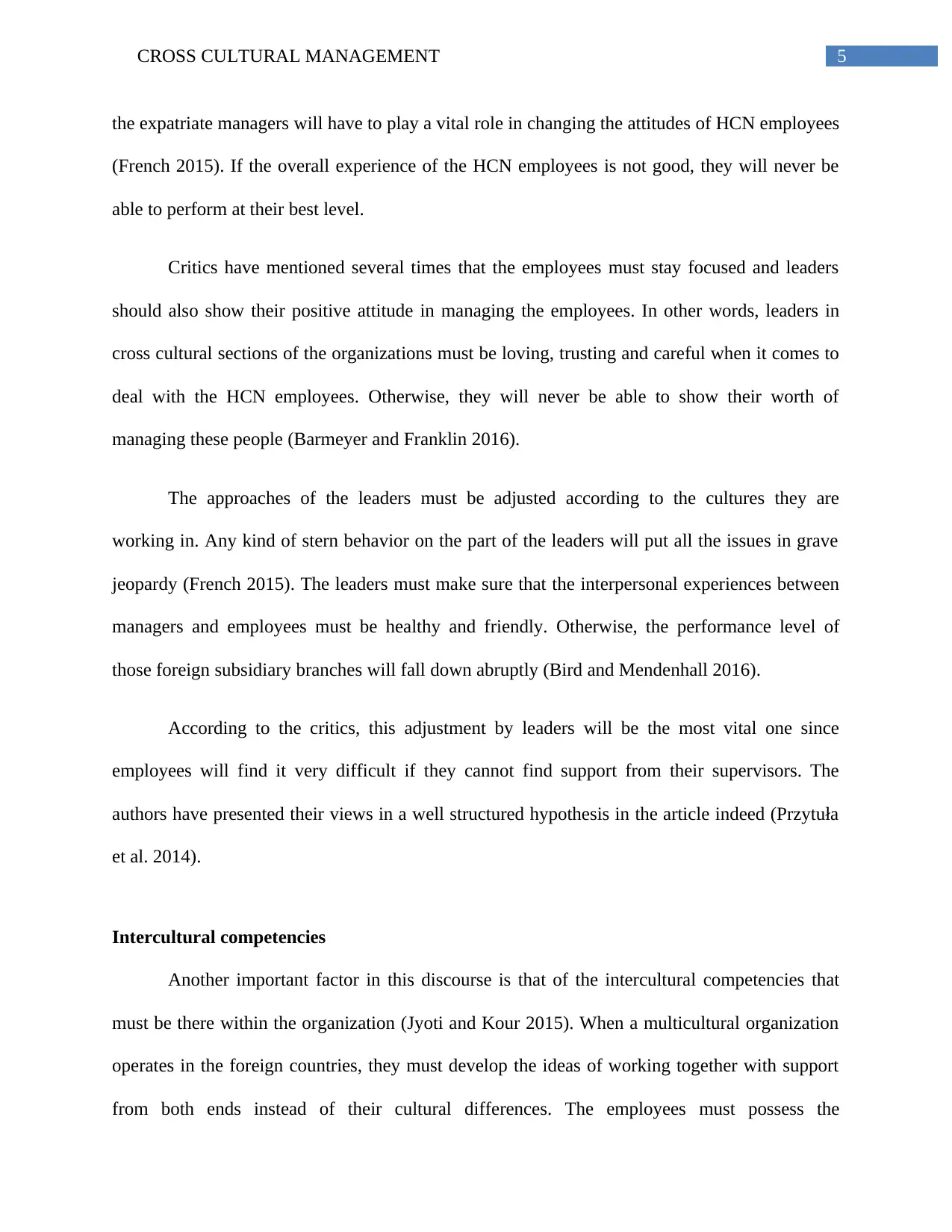
5CROSS CULTURAL MANAGEMENT
the expatriate managers will have to play a vital role in changing the attitudes of HCN employees
(French 2015). If the overall experience of the HCN employees is not good, they will never be
able to perform at their best level.
Critics have mentioned several times that the employees must stay focused and leaders
should also show their positive attitude in managing the employees. In other words, leaders in
cross cultural sections of the organizations must be loving, trusting and careful when it comes to
deal with the HCN employees. Otherwise, they will never be able to show their worth of
managing these people (Barmeyer and Franklin 2016).
The approaches of the leaders must be adjusted according to the cultures they are
working in. Any kind of stern behavior on the part of the leaders will put all the issues in grave
jeopardy (French 2015). The leaders must make sure that the interpersonal experiences between
managers and employees must be healthy and friendly. Otherwise, the performance level of
those foreign subsidiary branches will fall down abruptly (Bird and Mendenhall 2016).
According to the critics, this adjustment by leaders will be the most vital one since
employees will find it very difficult if they cannot find support from their supervisors. The
authors have presented their views in a well structured hypothesis in the article indeed (Przytuła
et al. 2014).
Intercultural competencies
Another important factor in this discourse is that of the intercultural competencies that
must be there within the organization (Jyoti and Kour 2015). When a multicultural organization
operates in the foreign countries, they must develop the ideas of working together with support
from both ends instead of their cultural differences. The employees must possess the
the expatriate managers will have to play a vital role in changing the attitudes of HCN employees
(French 2015). If the overall experience of the HCN employees is not good, they will never be
able to perform at their best level.
Critics have mentioned several times that the employees must stay focused and leaders
should also show their positive attitude in managing the employees. In other words, leaders in
cross cultural sections of the organizations must be loving, trusting and careful when it comes to
deal with the HCN employees. Otherwise, they will never be able to show their worth of
managing these people (Barmeyer and Franklin 2016).
The approaches of the leaders must be adjusted according to the cultures they are
working in. Any kind of stern behavior on the part of the leaders will put all the issues in grave
jeopardy (French 2015). The leaders must make sure that the interpersonal experiences between
managers and employees must be healthy and friendly. Otherwise, the performance level of
those foreign subsidiary branches will fall down abruptly (Bird and Mendenhall 2016).
According to the critics, this adjustment by leaders will be the most vital one since
employees will find it very difficult if they cannot find support from their supervisors. The
authors have presented their views in a well structured hypothesis in the article indeed (Przytuła
et al. 2014).
Intercultural competencies
Another important factor in this discourse is that of the intercultural competencies that
must be there within the organization (Jyoti and Kour 2015). When a multicultural organization
operates in the foreign countries, they must develop the ideas of working together with support
from both ends instead of their cultural differences. The employees must possess the
⊘ This is a preview!⊘
Do you want full access?
Subscribe today to unlock all pages.

Trusted by 1+ million students worldwide
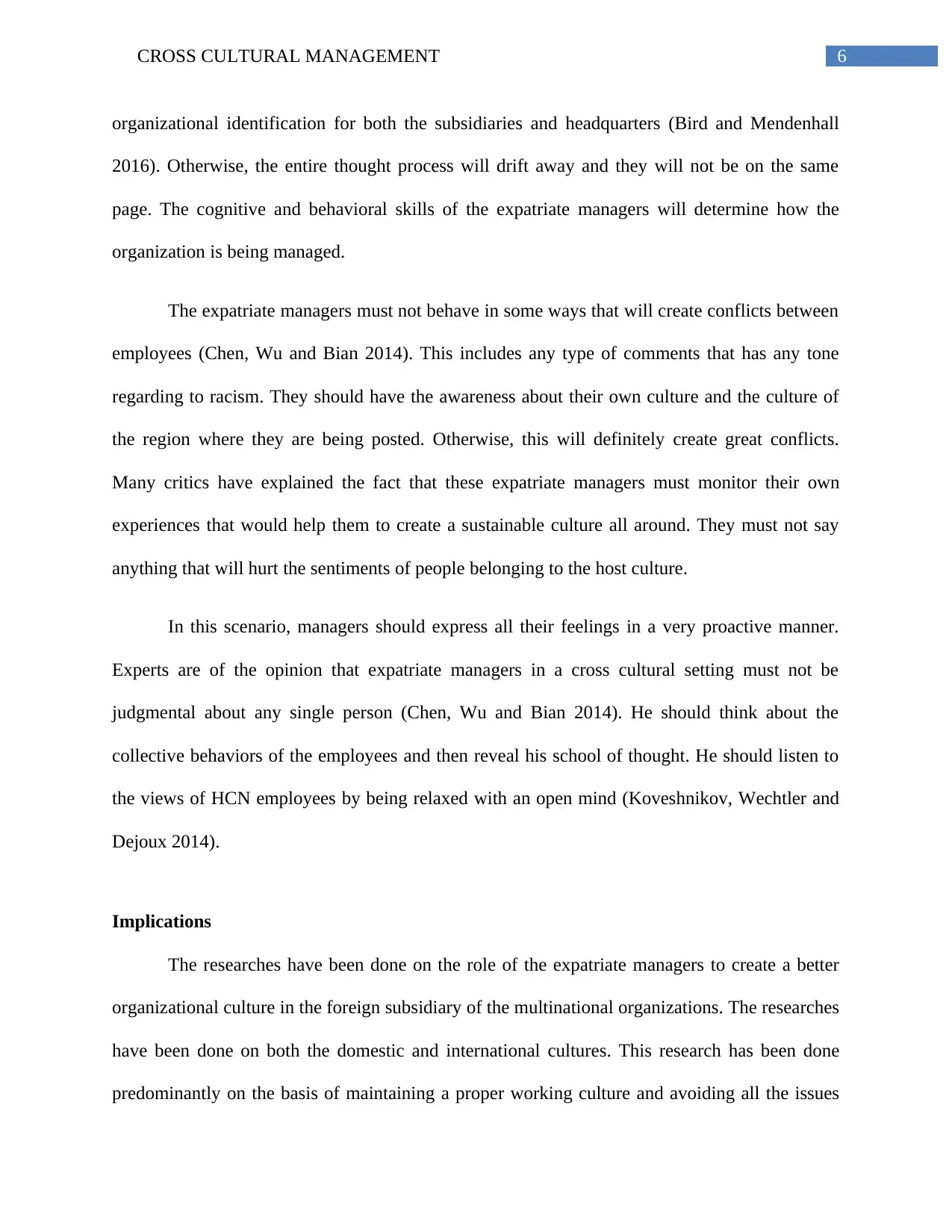
6CROSS CULTURAL MANAGEMENT
organizational identification for both the subsidiaries and headquarters (Bird and Mendenhall
2016). Otherwise, the entire thought process will drift away and they will not be on the same
page. The cognitive and behavioral skills of the expatriate managers will determine how the
organization is being managed.
The expatriate managers must not behave in some ways that will create conflicts between
employees (Chen, Wu and Bian 2014). This includes any type of comments that has any tone
regarding to racism. They should have the awareness about their own culture and the culture of
the region where they are being posted. Otherwise, this will definitely create great conflicts.
Many critics have explained the fact that these expatriate managers must monitor their own
experiences that would help them to create a sustainable culture all around. They must not say
anything that will hurt the sentiments of people belonging to the host culture.
In this scenario, managers should express all their feelings in a very proactive manner.
Experts are of the opinion that expatriate managers in a cross cultural setting must not be
judgmental about any single person (Chen, Wu and Bian 2014). He should think about the
collective behaviors of the employees and then reveal his school of thought. He should listen to
the views of HCN employees by being relaxed with an open mind (Koveshnikov, Wechtler and
Dejoux 2014).
Implications
The researches have been done on the role of the expatriate managers to create a better
organizational culture in the foreign subsidiary of the multinational organizations. The researches
have been done on both the domestic and international cultures. This research has been done
predominantly on the basis of maintaining a proper working culture and avoiding all the issues
organizational identification for both the subsidiaries and headquarters (Bird and Mendenhall
2016). Otherwise, the entire thought process will drift away and they will not be on the same
page. The cognitive and behavioral skills of the expatriate managers will determine how the
organization is being managed.
The expatriate managers must not behave in some ways that will create conflicts between
employees (Chen, Wu and Bian 2014). This includes any type of comments that has any tone
regarding to racism. They should have the awareness about their own culture and the culture of
the region where they are being posted. Otherwise, this will definitely create great conflicts.
Many critics have explained the fact that these expatriate managers must monitor their own
experiences that would help them to create a sustainable culture all around. They must not say
anything that will hurt the sentiments of people belonging to the host culture.
In this scenario, managers should express all their feelings in a very proactive manner.
Experts are of the opinion that expatriate managers in a cross cultural setting must not be
judgmental about any single person (Chen, Wu and Bian 2014). He should think about the
collective behaviors of the employees and then reveal his school of thought. He should listen to
the views of HCN employees by being relaxed with an open mind (Koveshnikov, Wechtler and
Dejoux 2014).
Implications
The researches have been done on the role of the expatriate managers to create a better
organizational culture in the foreign subsidiary of the multinational organizations. The researches
have been done on both the domestic and international cultures. This research has been done
predominantly on the basis of maintaining a proper working culture and avoiding all the issues
Paraphrase This Document
Need a fresh take? Get an instant paraphrase of this document with our AI Paraphraser
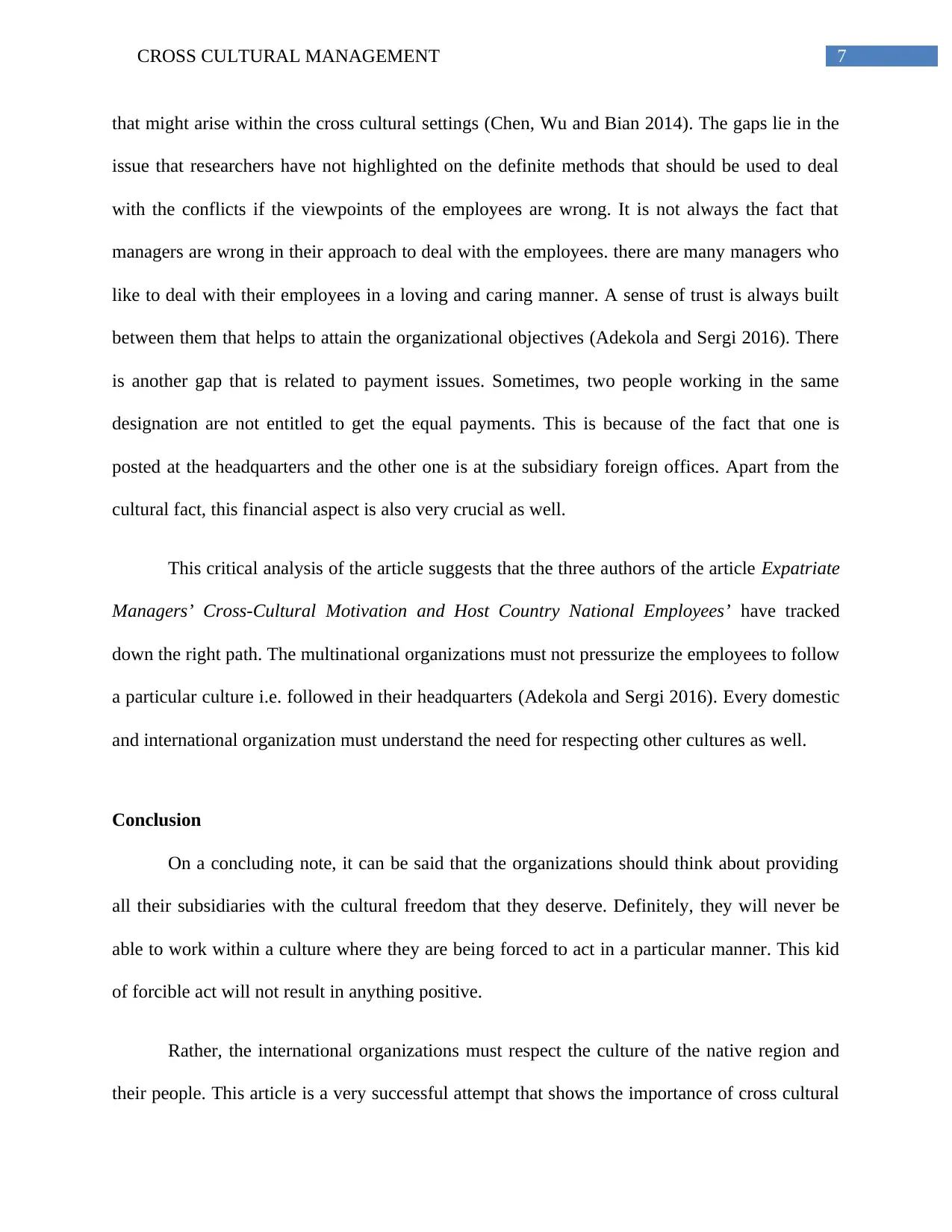
7CROSS CULTURAL MANAGEMENT
that might arise within the cross cultural settings (Chen, Wu and Bian 2014). The gaps lie in the
issue that researchers have not highlighted on the definite methods that should be used to deal
with the conflicts if the viewpoints of the employees are wrong. It is not always the fact that
managers are wrong in their approach to deal with the employees. there are many managers who
like to deal with their employees in a loving and caring manner. A sense of trust is always built
between them that helps to attain the organizational objectives (Adekola and Sergi 2016). There
is another gap that is related to payment issues. Sometimes, two people working in the same
designation are not entitled to get the equal payments. This is because of the fact that one is
posted at the headquarters and the other one is at the subsidiary foreign offices. Apart from the
cultural fact, this financial aspect is also very crucial as well.
This critical analysis of the article suggests that the three authors of the article Expatriate
Managers’ Cross-Cultural Motivation and Host Country National Employees’ have tracked
down the right path. The multinational organizations must not pressurize the employees to follow
a particular culture i.e. followed in their headquarters (Adekola and Sergi 2016). Every domestic
and international organization must understand the need for respecting other cultures as well.
Conclusion
On a concluding note, it can be said that the organizations should think about providing
all their subsidiaries with the cultural freedom that they deserve. Definitely, they will never be
able to work within a culture where they are being forced to act in a particular manner. This kid
of forcible act will not result in anything positive.
Rather, the international organizations must respect the culture of the native region and
their people. This article is a very successful attempt that shows the importance of cross cultural
that might arise within the cross cultural settings (Chen, Wu and Bian 2014). The gaps lie in the
issue that researchers have not highlighted on the definite methods that should be used to deal
with the conflicts if the viewpoints of the employees are wrong. It is not always the fact that
managers are wrong in their approach to deal with the employees. there are many managers who
like to deal with their employees in a loving and caring manner. A sense of trust is always built
between them that helps to attain the organizational objectives (Adekola and Sergi 2016). There
is another gap that is related to payment issues. Sometimes, two people working in the same
designation are not entitled to get the equal payments. This is because of the fact that one is
posted at the headquarters and the other one is at the subsidiary foreign offices. Apart from the
cultural fact, this financial aspect is also very crucial as well.
This critical analysis of the article suggests that the three authors of the article Expatriate
Managers’ Cross-Cultural Motivation and Host Country National Employees’ have tracked
down the right path. The multinational organizations must not pressurize the employees to follow
a particular culture i.e. followed in their headquarters (Adekola and Sergi 2016). Every domestic
and international organization must understand the need for respecting other cultures as well.
Conclusion
On a concluding note, it can be said that the organizations should think about providing
all their subsidiaries with the cultural freedom that they deserve. Definitely, they will never be
able to work within a culture where they are being forced to act in a particular manner. This kid
of forcible act will not result in anything positive.
Rather, the international organizations must respect the culture of the native region and
their people. This article is a very successful attempt that shows the importance of cross cultural
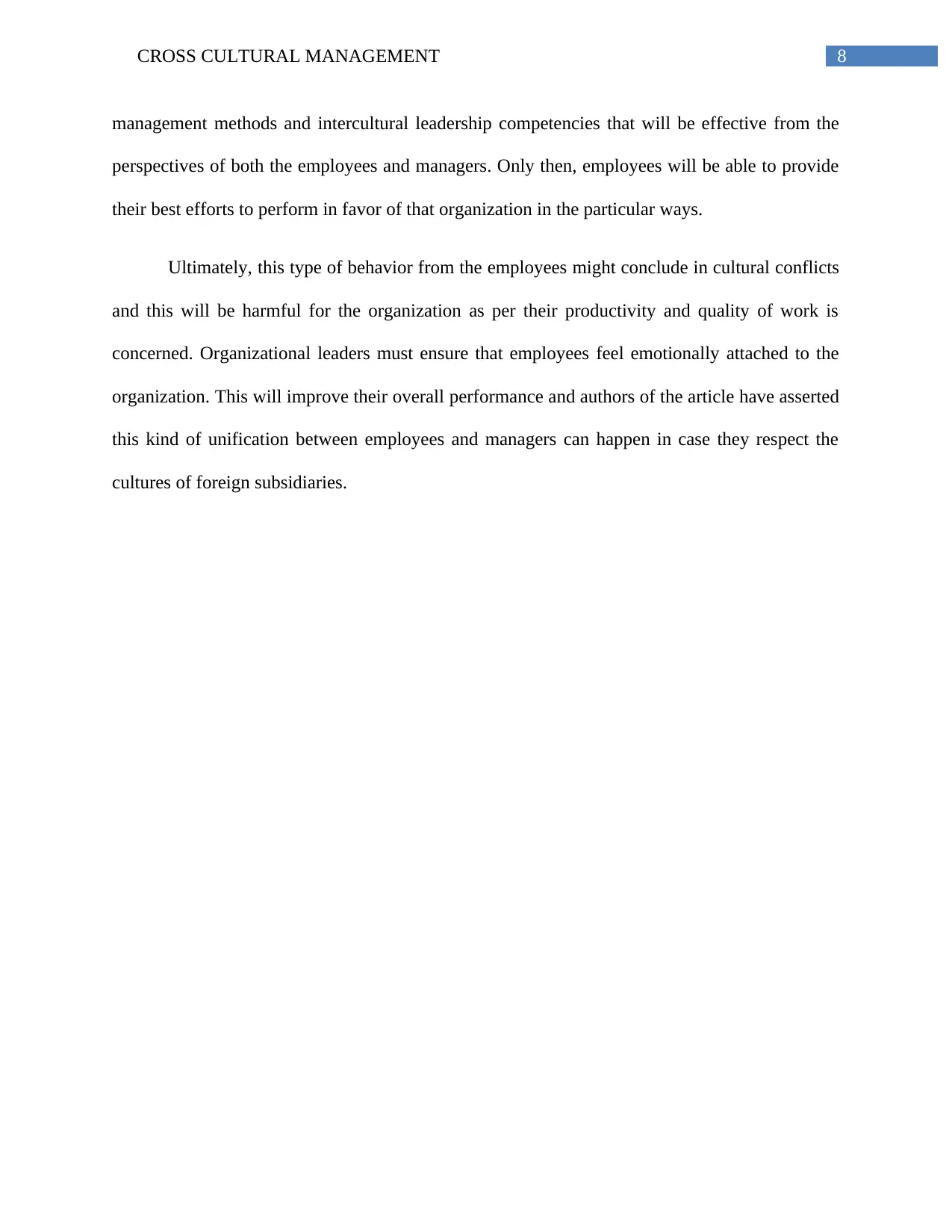
8CROSS CULTURAL MANAGEMENT
management methods and intercultural leadership competencies that will be effective from the
perspectives of both the employees and managers. Only then, employees will be able to provide
their best efforts to perform in favor of that organization in the particular ways.
Ultimately, this type of behavior from the employees might conclude in cultural conflicts
and this will be harmful for the organization as per their productivity and quality of work is
concerned. Organizational leaders must ensure that employees feel emotionally attached to the
organization. This will improve their overall performance and authors of the article have asserted
this kind of unification between employees and managers can happen in case they respect the
cultures of foreign subsidiaries.
management methods and intercultural leadership competencies that will be effective from the
perspectives of both the employees and managers. Only then, employees will be able to provide
their best efforts to perform in favor of that organization in the particular ways.
Ultimately, this type of behavior from the employees might conclude in cultural conflicts
and this will be harmful for the organization as per their productivity and quality of work is
concerned. Organizational leaders must ensure that employees feel emotionally attached to the
organization. This will improve their overall performance and authors of the article have asserted
this kind of unification between employees and managers can happen in case they respect the
cultures of foreign subsidiaries.
⊘ This is a preview!⊘
Do you want full access?
Subscribe today to unlock all pages.

Trusted by 1+ million students worldwide
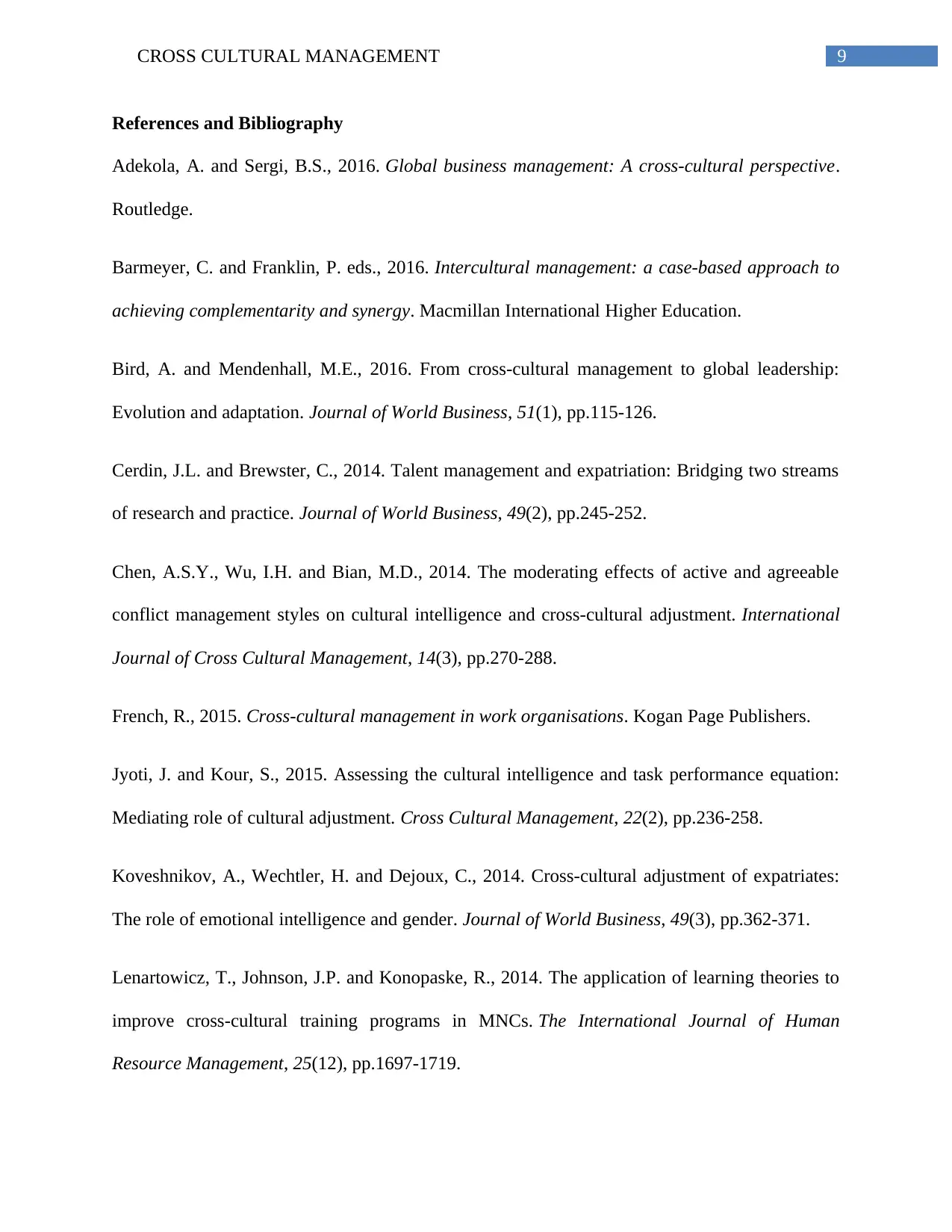
9CROSS CULTURAL MANAGEMENT
References and Bibliography
Adekola, A. and Sergi, B.S., 2016. Global business management: A cross-cultural perspective.
Routledge.
Barmeyer, C. and Franklin, P. eds., 2016. Intercultural management: a case-based approach to
achieving complementarity and synergy. Macmillan International Higher Education.
Bird, A. and Mendenhall, M.E., 2016. From cross-cultural management to global leadership:
Evolution and adaptation. Journal of World Business, 51(1), pp.115-126.
Cerdin, J.L. and Brewster, C., 2014. Talent management and expatriation: Bridging two streams
of research and practice. Journal of World Business, 49(2), pp.245-252.
Chen, A.S.Y., Wu, I.H. and Bian, M.D., 2014. The moderating effects of active and agreeable
conflict management styles on cultural intelligence and cross-cultural adjustment. International
Journal of Cross Cultural Management, 14(3), pp.270-288.
French, R., 2015. Cross-cultural management in work organisations. Kogan Page Publishers.
Jyoti, J. and Kour, S., 2015. Assessing the cultural intelligence and task performance equation:
Mediating role of cultural adjustment. Cross Cultural Management, 22(2), pp.236-258.
Koveshnikov, A., Wechtler, H. and Dejoux, C., 2014. Cross-cultural adjustment of expatriates:
The role of emotional intelligence and gender. Journal of World Business, 49(3), pp.362-371.
Lenartowicz, T., Johnson, J.P. and Konopaske, R., 2014. The application of learning theories to
improve cross-cultural training programs in MNCs. The International Journal of Human
Resource Management, 25(12), pp.1697-1719.
References and Bibliography
Adekola, A. and Sergi, B.S., 2016. Global business management: A cross-cultural perspective.
Routledge.
Barmeyer, C. and Franklin, P. eds., 2016. Intercultural management: a case-based approach to
achieving complementarity and synergy. Macmillan International Higher Education.
Bird, A. and Mendenhall, M.E., 2016. From cross-cultural management to global leadership:
Evolution and adaptation. Journal of World Business, 51(1), pp.115-126.
Cerdin, J.L. and Brewster, C., 2014. Talent management and expatriation: Bridging two streams
of research and practice. Journal of World Business, 49(2), pp.245-252.
Chen, A.S.Y., Wu, I.H. and Bian, M.D., 2014. The moderating effects of active and agreeable
conflict management styles on cultural intelligence and cross-cultural adjustment. International
Journal of Cross Cultural Management, 14(3), pp.270-288.
French, R., 2015. Cross-cultural management in work organisations. Kogan Page Publishers.
Jyoti, J. and Kour, S., 2015. Assessing the cultural intelligence and task performance equation:
Mediating role of cultural adjustment. Cross Cultural Management, 22(2), pp.236-258.
Koveshnikov, A., Wechtler, H. and Dejoux, C., 2014. Cross-cultural adjustment of expatriates:
The role of emotional intelligence and gender. Journal of World Business, 49(3), pp.362-371.
Lenartowicz, T., Johnson, J.P. and Konopaske, R., 2014. The application of learning theories to
improve cross-cultural training programs in MNCs. The International Journal of Human
Resource Management, 25(12), pp.1697-1719.
Paraphrase This Document
Need a fresh take? Get an instant paraphrase of this document with our AI Paraphraser
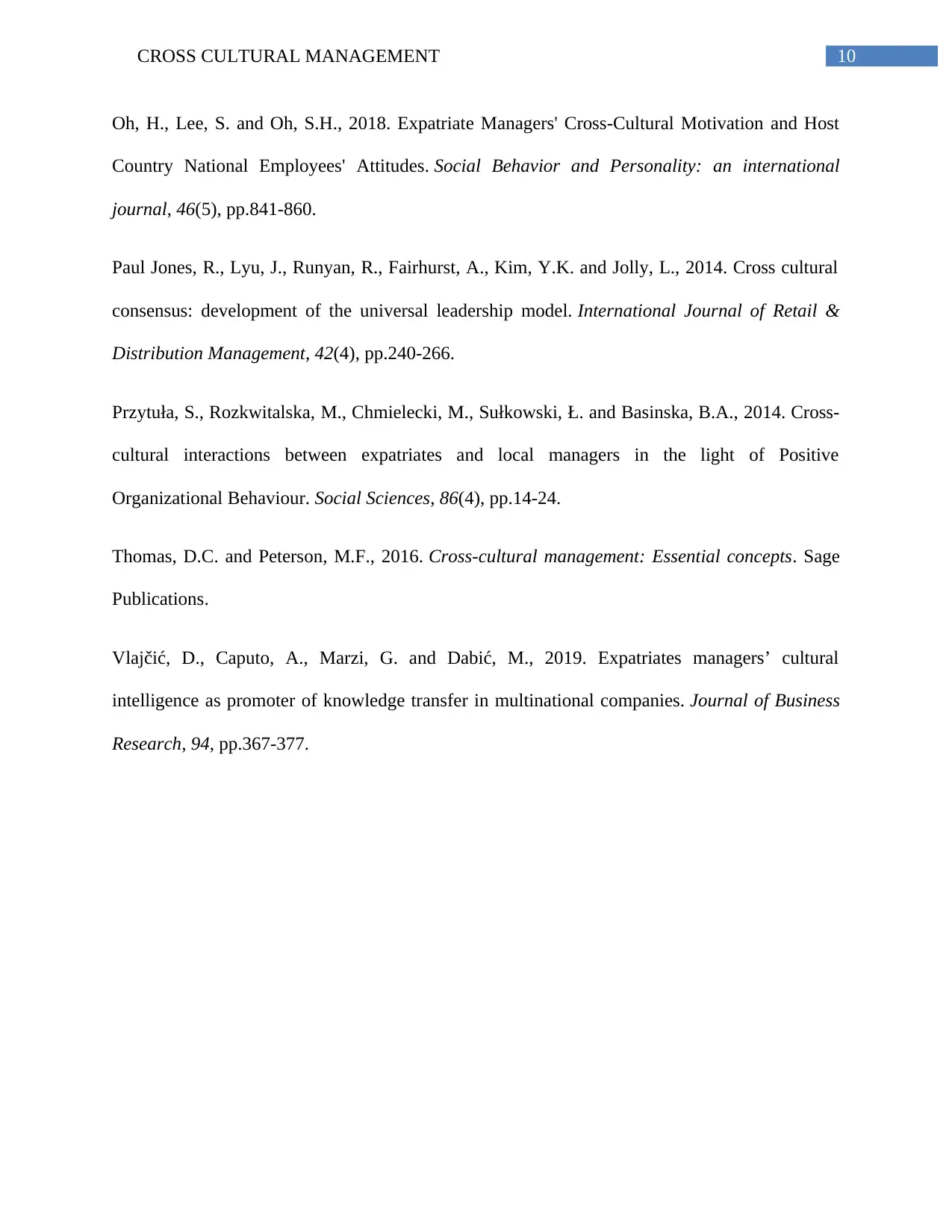
10CROSS CULTURAL MANAGEMENT
Oh, H., Lee, S. and Oh, S.H., 2018. Expatriate Managers' Cross-Cultural Motivation and Host
Country National Employees' Attitudes. Social Behavior and Personality: an international
journal, 46(5), pp.841-860.
Paul Jones, R., Lyu, J., Runyan, R., Fairhurst, A., Kim, Y.K. and Jolly, L., 2014. Cross cultural
consensus: development of the universal leadership model. International Journal of Retail &
Distribution Management, 42(4), pp.240-266.
Przytuła, S., Rozkwitalska, M., Chmielecki, M., Sułkowski, Ł. and Basinska, B.A., 2014. Cross-
cultural interactions between expatriates and local managers in the light of Positive
Organizational Behaviour. Social Sciences, 86(4), pp.14-24.
Thomas, D.C. and Peterson, M.F., 2016. Cross-cultural management: Essential concepts. Sage
Publications.
Vlajčić, D., Caputo, A., Marzi, G. and Dabić, M., 2019. Expatriates managers’ cultural
intelligence as promoter of knowledge transfer in multinational companies. Journal of Business
Research, 94, pp.367-377.
Oh, H., Lee, S. and Oh, S.H., 2018. Expatriate Managers' Cross-Cultural Motivation and Host
Country National Employees' Attitudes. Social Behavior and Personality: an international
journal, 46(5), pp.841-860.
Paul Jones, R., Lyu, J., Runyan, R., Fairhurst, A., Kim, Y.K. and Jolly, L., 2014. Cross cultural
consensus: development of the universal leadership model. International Journal of Retail &
Distribution Management, 42(4), pp.240-266.
Przytuła, S., Rozkwitalska, M., Chmielecki, M., Sułkowski, Ł. and Basinska, B.A., 2014. Cross-
cultural interactions between expatriates and local managers in the light of Positive
Organizational Behaviour. Social Sciences, 86(4), pp.14-24.
Thomas, D.C. and Peterson, M.F., 2016. Cross-cultural management: Essential concepts. Sage
Publications.
Vlajčić, D., Caputo, A., Marzi, G. and Dabić, M., 2019. Expatriates managers’ cultural
intelligence as promoter of knowledge transfer in multinational companies. Journal of Business
Research, 94, pp.367-377.
1 out of 11
Related Documents
Your All-in-One AI-Powered Toolkit for Academic Success.
+13062052269
info@desklib.com
Available 24*7 on WhatsApp / Email
![[object Object]](/_next/static/media/star-bottom.7253800d.svg)
Unlock your academic potential
Copyright © 2020–2026 A2Z Services. All Rights Reserved. Developed and managed by ZUCOL.





